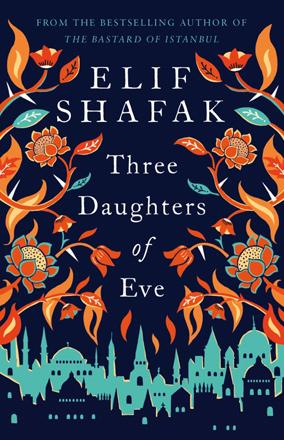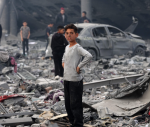You are here
A modern tragedy
By Sally Bland - Apr 19,2020 - Last updated at Apr 19,2020

Home Fire
Kamila Shamsie
London: Bloomsbury Publishing
Pp. 264
In her powerful, indeed explosive, seventh novel, Kamila Shamsie imbues the ancient story of Antigone with new, contemporary meaning. The plot of “Home Fire” spreads over three continents and has international implications, but it is first and foremost about the situation of British Muslims. Just as Antigone challenged King Creon to allow her brother a proper burial after he had led a rebellion against the tyrant, 21st-century teenager, Aneeka, fights for justice for her twin, who had travelled to Syria to join Daesh. While refuting terrorism, this novel also questions the refusal of the UK, inter alia, to repatriate their citizens from the war zone.
Beyond such considerations, “Home Fire” is essentially about love, family, the lengths to which people will go for their loved ones, and the strategies they employ for surviving in a hostile world. The novel’s epigraph highlights the dilemma as stated in Sophocles’s tragedy: “The ones we love… are enemies of the state”.
Shamsie divides her book into five parts, with each of the main characters relating their perspective, thus telling several sides of the story and opening up for multiple interpretations. Three of the main characters, Isma, Aneeka and Parvais Pasha, are orphans, abandoned by their father who went to fight in Bosnia, Chechnya, Kashmir, Kosovo and finally Afghanistan, his name erased from the family memory. When the twins, Aneeka and Parvais, are still young, their grandmother and mother die in quick succession, leaving big sister Isma to raise them. Isma is the responsible one, delaying her academic career and working at a dry cleaner, in order to provide for her small family. She is acutely aware of how easily the Pakistani background of her parents, especially her now-deceased father’s “jihadi” history, can be turned against them, rendering them outsiders, foreigners, despite having been born in London and never visited Pakistan. Her response is to toe the line, making the compromises and calculations needed to avoid being harassed by the secret service and having one’s loyalty questioned.
Aneeka is more daring, more volatile, railing against large and small acts of othering, from lengthy interrogations at the airport to false expectations attached to her wearing the hijab. Her choice to study law is emblematic of her determination to face racism and injustice head on. To Isma, “Her sister, not quite nineteen, with her law-student brain… knew everything about her rights and nothing about the fragility of her place in the world”. (p. 6)
Parvais, meanwhile, seems somewhat oblivious, caring mostly about his sound system, until a Daesh recruiter appeals to his need to reclaim his father’s history and replace the alienation of his life in Britain with a sense of belonging. As the novel opens, his sense of being alone and betrayed is magnified by Isma’s departure to the US, to resume her graduate studies, and Aneeka’s increasingly independent life. Arriving in Raqqa, at the height of Daesh’s self-proclaimed Caliphate, he soon discovers his mistake after a few months in the media unit, but it is not easy to retrace his steps. “He didn’t know how to break out of these currents of history, how to shake free of the demons he had attached to his own heels”. (p. 171)
The counterpoint to the Pashas is the Lone family headed by Karamat, son of Pakistani immigrants, who has combined opportunism, belief in British democracy and a propitious marriage, to rise on the political scene. Having renounced his Muslim background and recently become Home Secretary, he immediately revokes the passports of anyone judged to be acting against state interests, making citizenship a privilege not a right. Though he can prevent Parvais’s repatriation, he is powerless to stop his charming, intelligent, somewhat spoiled son, Eemonn (an Anglicisation of Ayman), once the latter falls in love with Aneeka. Raised to feel entirely British, Eemonn has no reason to fear Googling While Muslim as do the Pasha siblings, but his love for Aneeka shows him another side of reality. From having previously put his father on a pedestal, Eemonn becomes “a son who was moving in the opposite direction of home, burning bridges in his wake, a trail of fire in the sky”. (p. 239)
These seminal changes cleave both families apart.
Shamsie amazes with her ability to portray the impact of the big currents of history on individual lives, employing rich visceral and sensory impressions and local details that lend authenticity to her narrative. For Isma, it is the sense of touch that denotes her love for the twins, harking back to her physical care of them as young. Similarly, for the twins, their sense of being one is reaffirmed by touching each other’s pulse. For Parvais, sound is all pervasive, from the trilling of birds to the screams of the tortured in Bagram prison, where his father was held by US forces, and the jarring echoes of violence in the Caliphate. Interspersing starkly revealing prose with beautiful lyricism and sometimes humorous wordplay, Shamsie’s nuanced descriptions of the meaning of love, betrayal, memory, loss and grief tugs at one’s heart.
Though most of the novel is heightened realism, its ending slips over into the surrealistic, leaving one with haunting images, conflicted emotions, and a sense that justice does not always prevail.
Related Articles
In “Chaos of the Senses”, Algerian writer Ahlem Mosteghanemi tells the story of a great love (or loves), with a tantalising twist. The man with whom protagonist and narrator Hayat falls in love is a character in a short story that she has written.
This is a novel that celebrates love, caring, sincerity and intellect, but the opposing forces — intolerance, violence, hypocrisy and ignorance — loom large in the story. Obviously, Saudi author Laila Aljohani is not living in a bubble, but is keenly aware that one is not always rewarded for giving love or sticking to one’s principles. What happens to her beautifully crafted main characters when they fall in love, illustrates the point.
Three Daughters of EveElif ShafakUK: Viking/Penguin Random House, 2016Pp.















